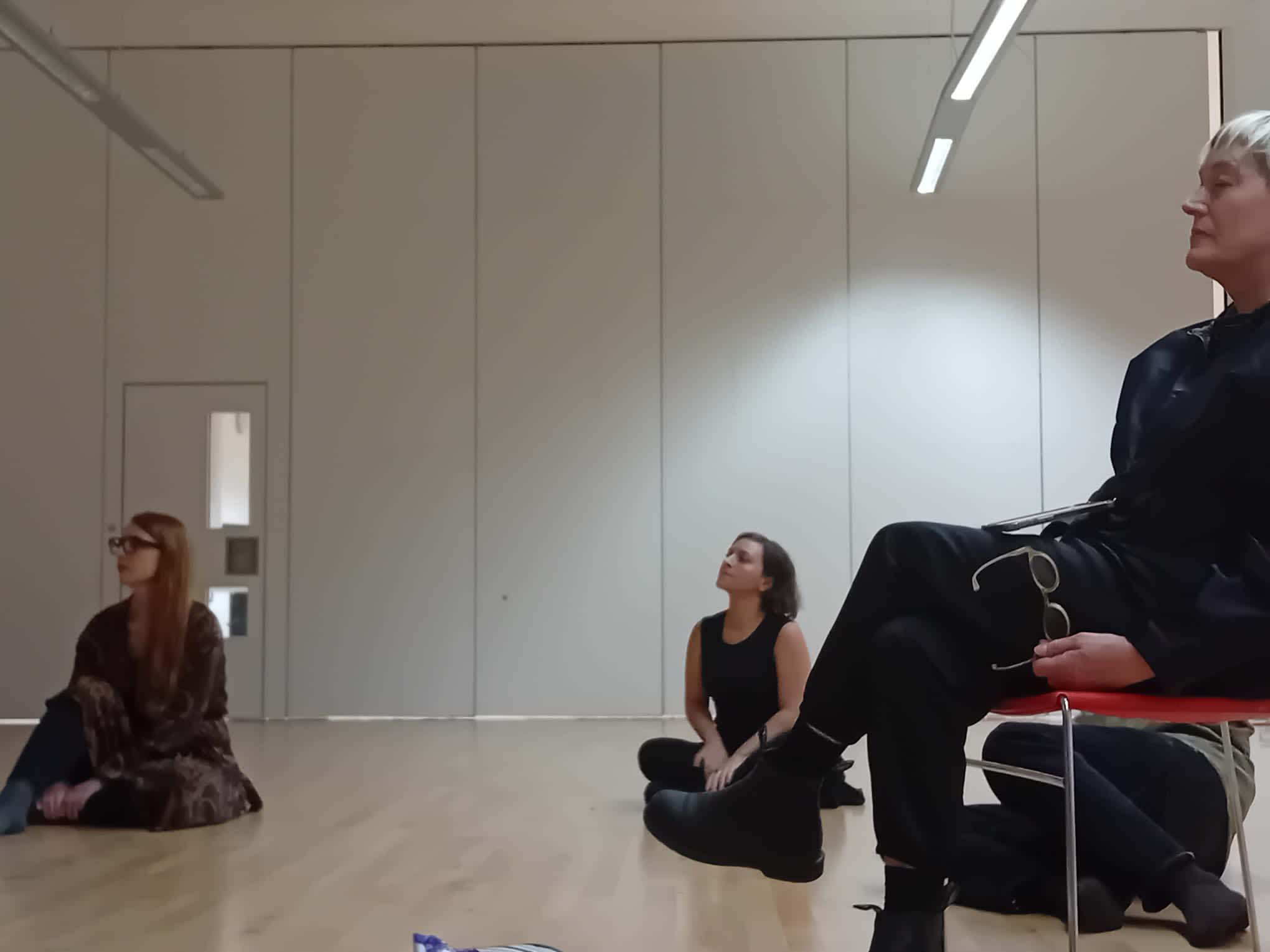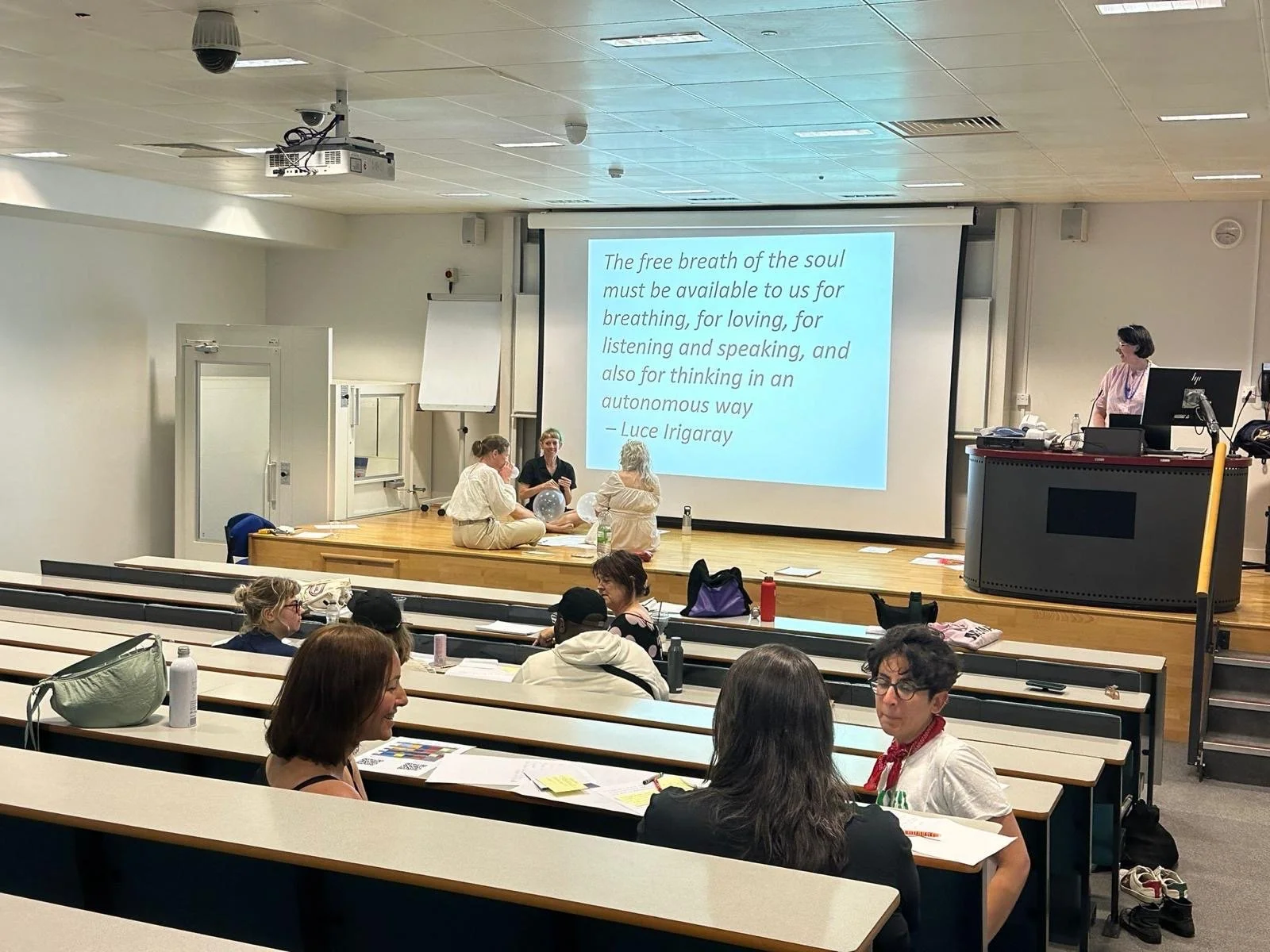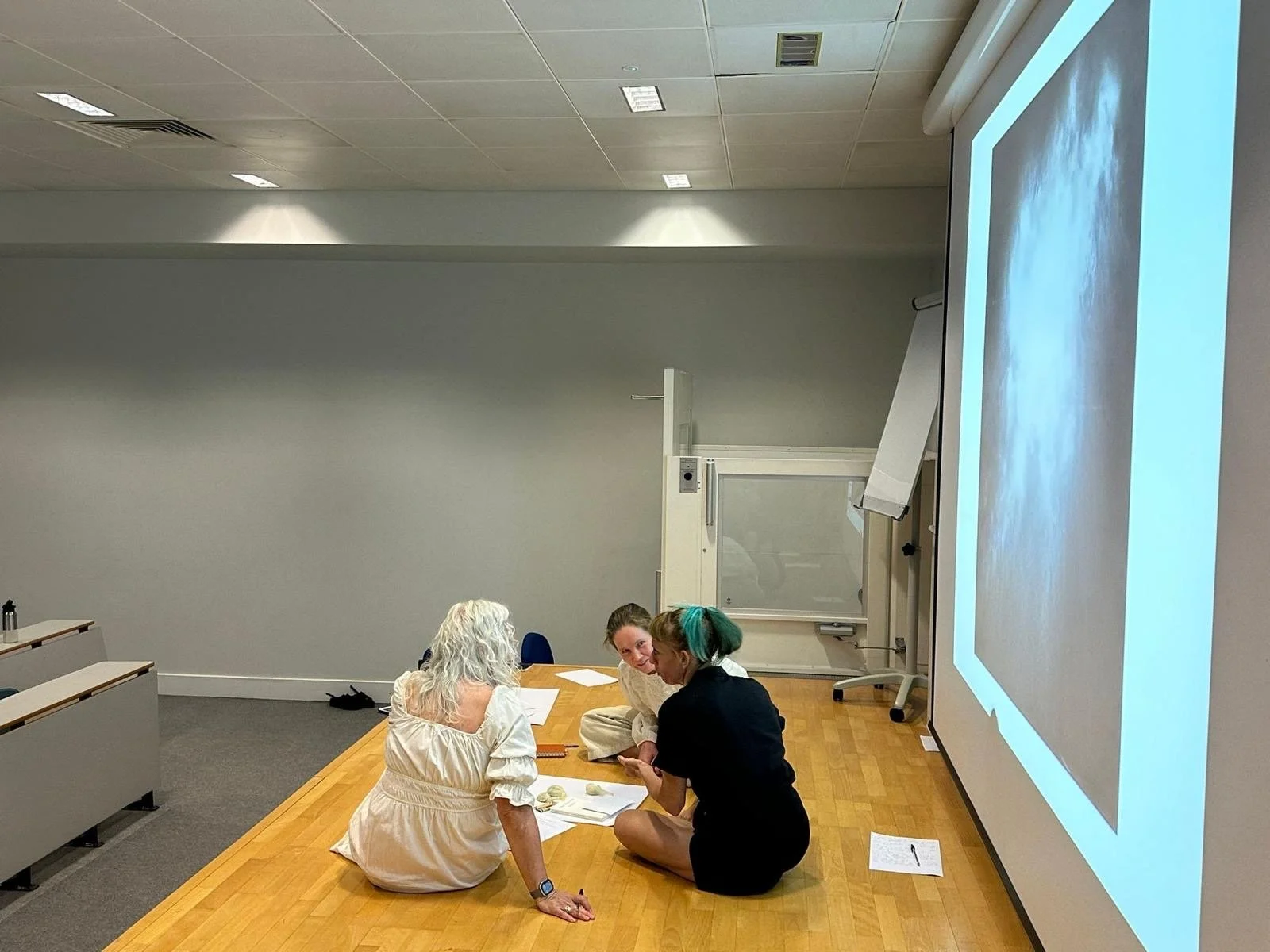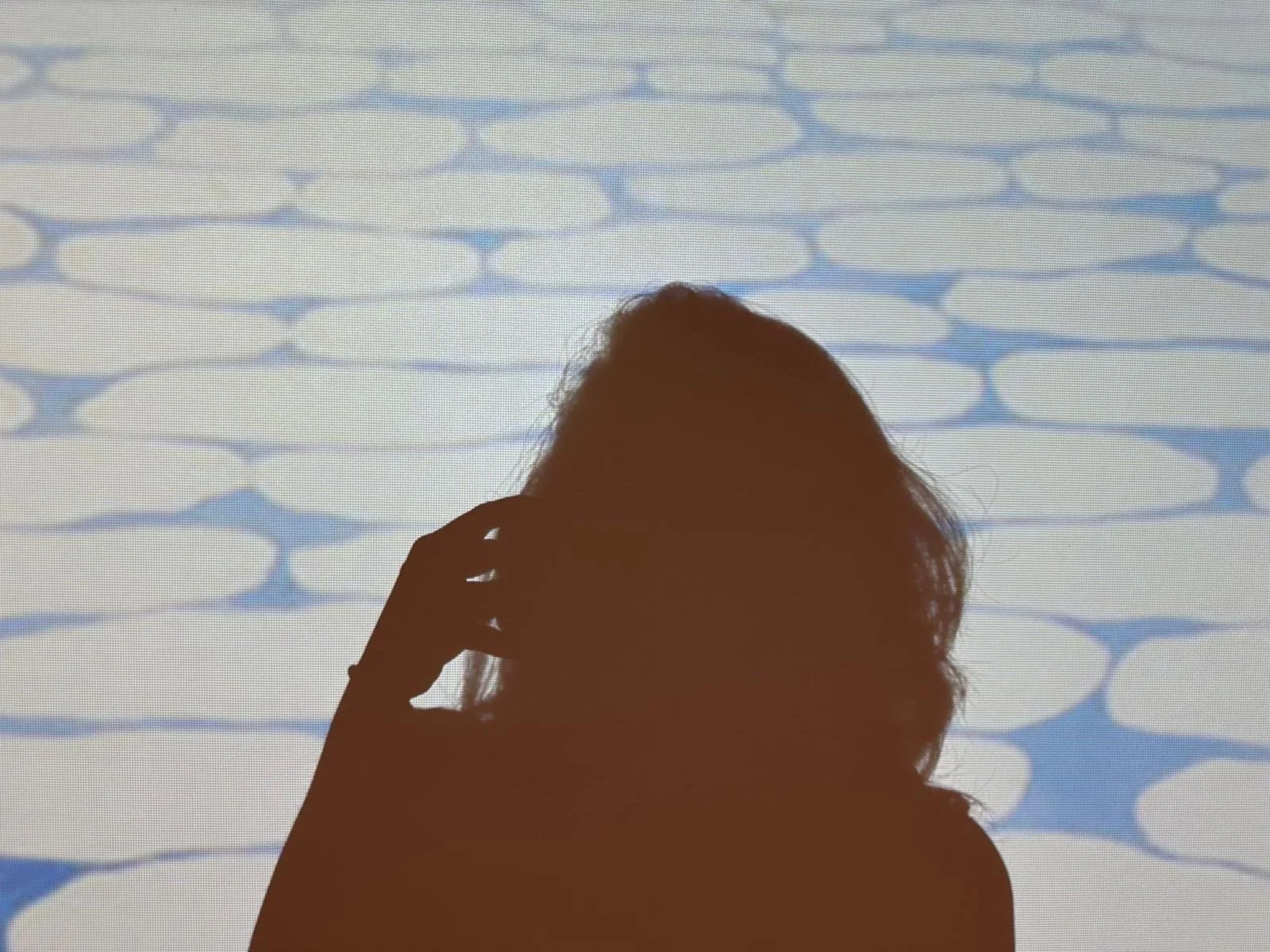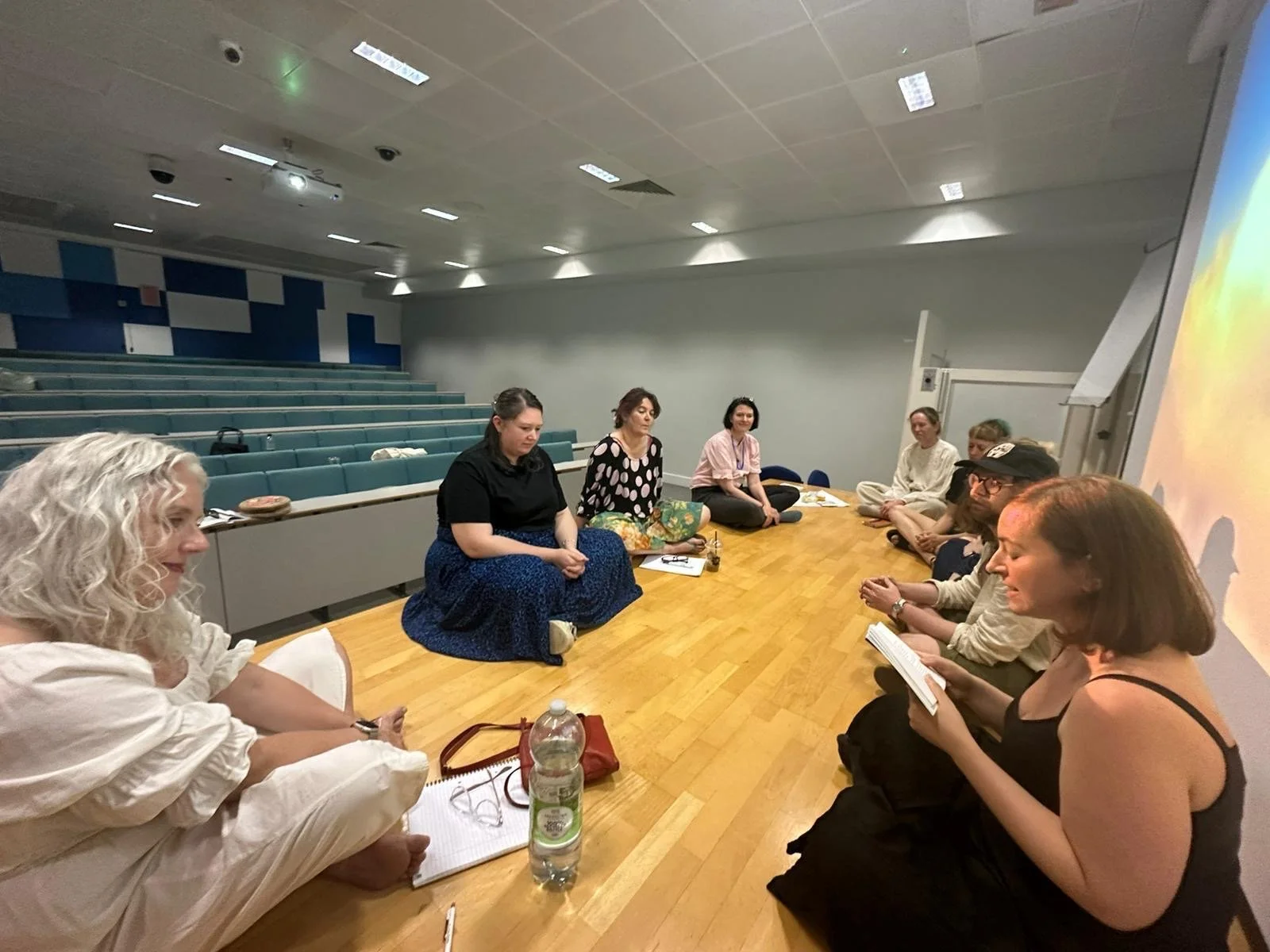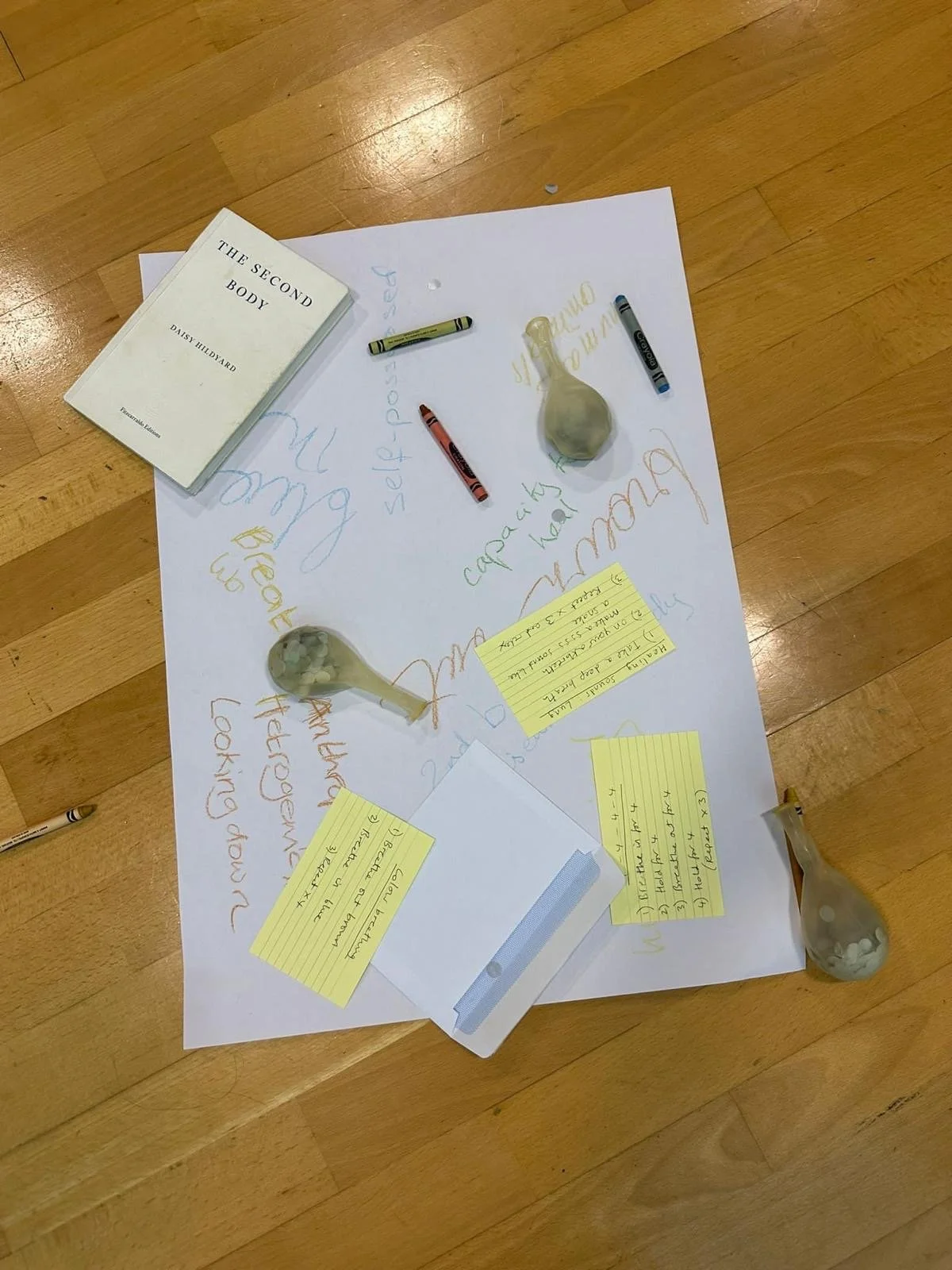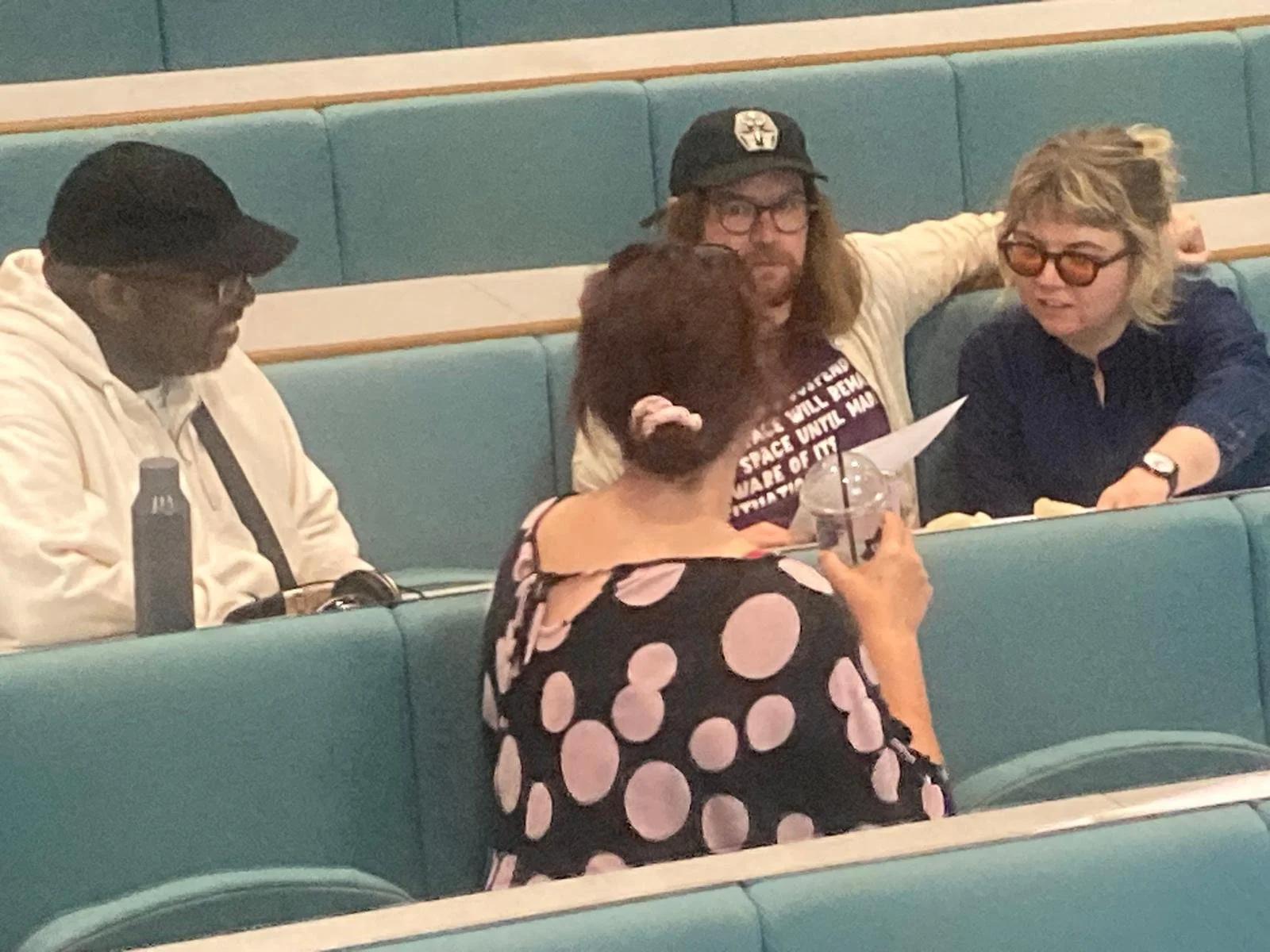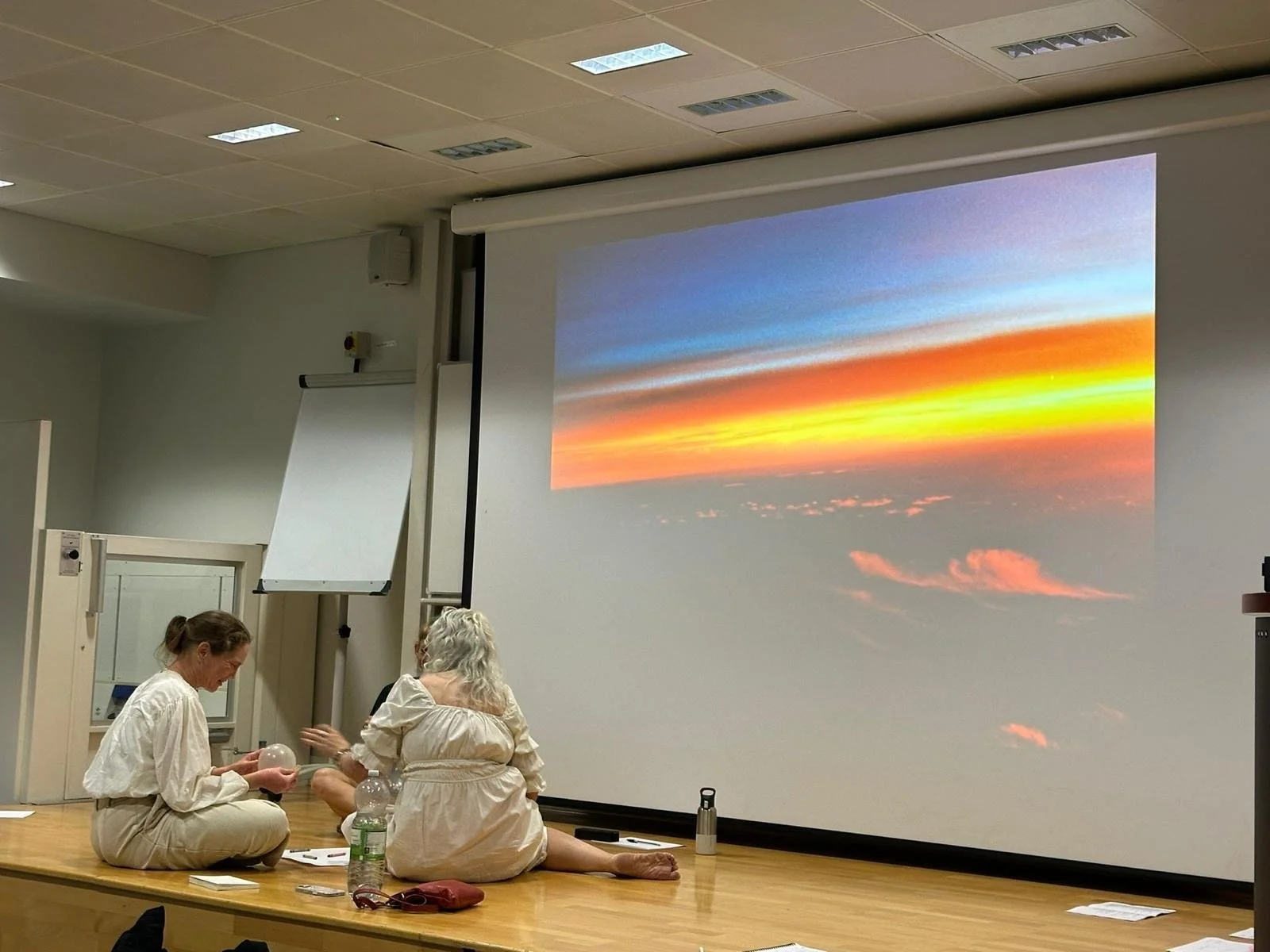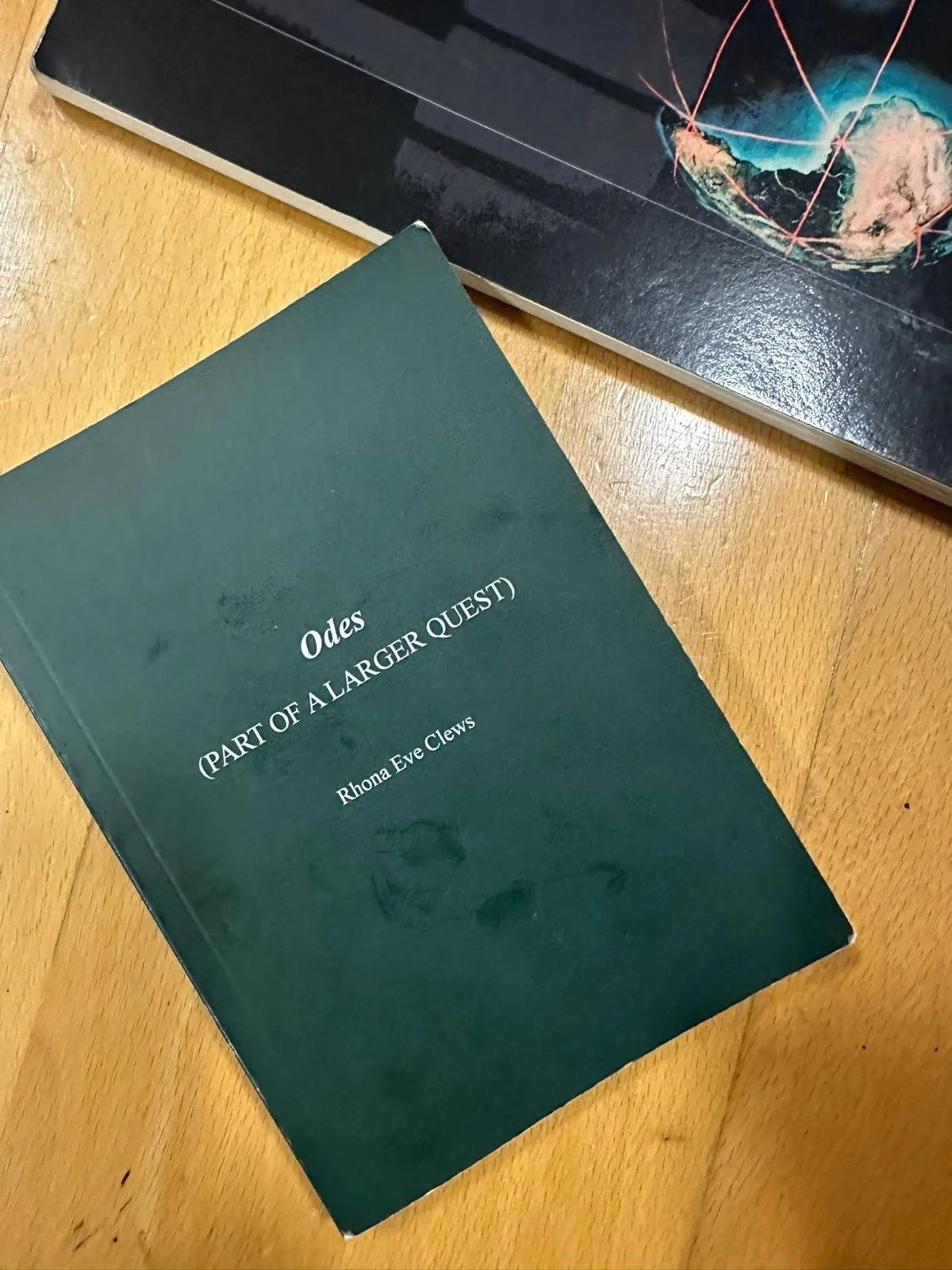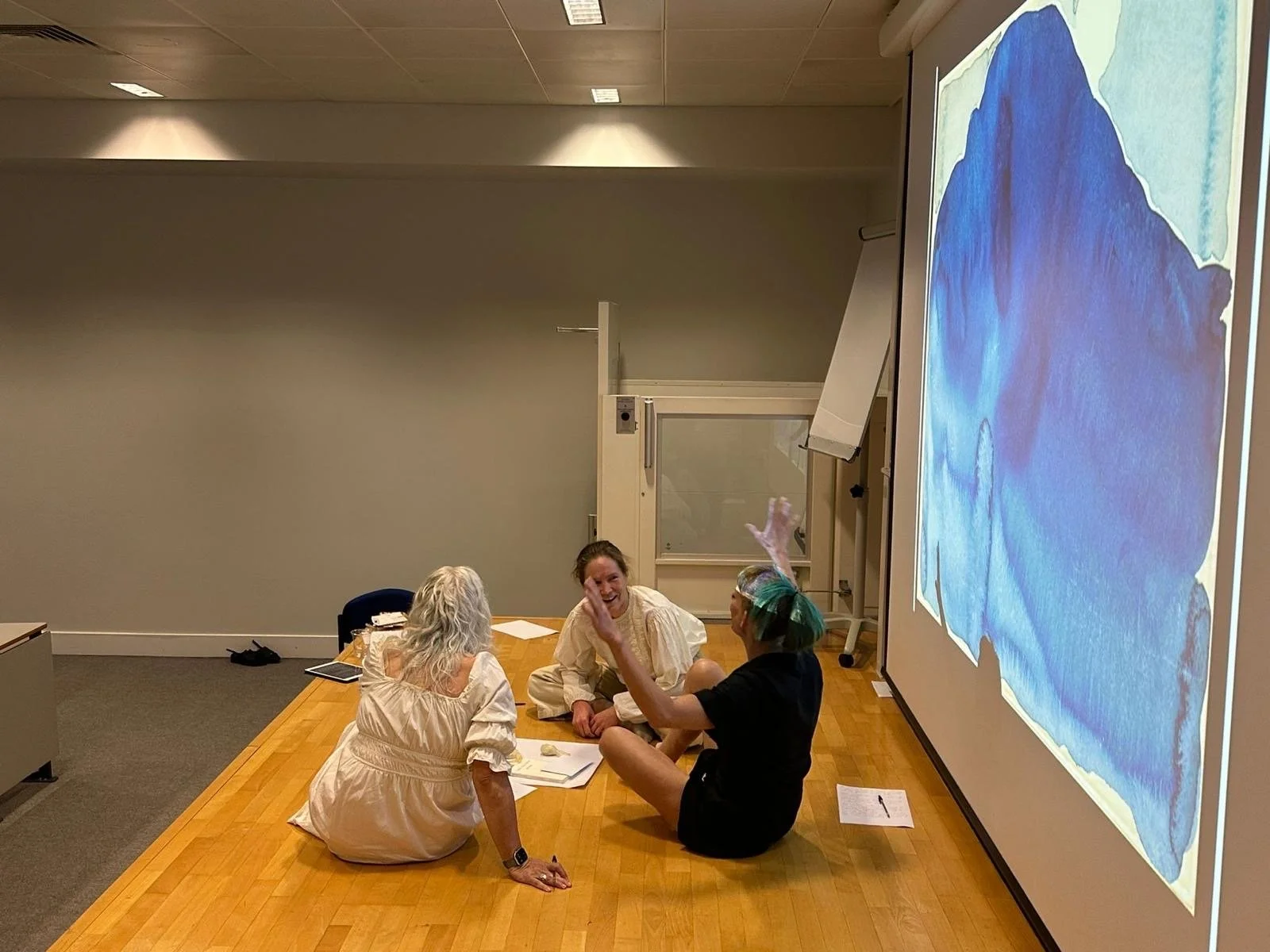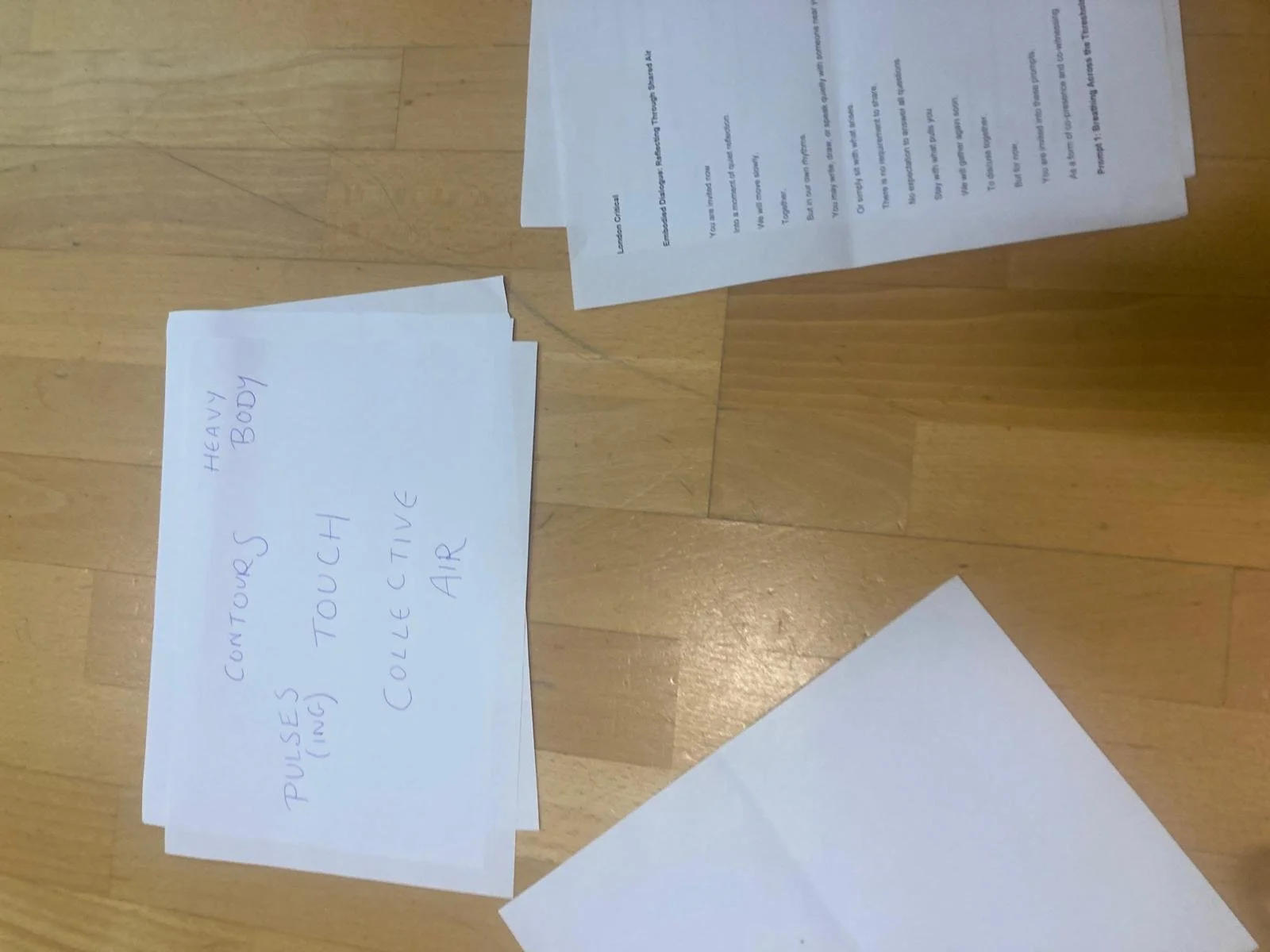Breath(ing) with
‘Histories that Hurt’
We Share Air
In Brief: Embodied Circular Readings
Embodied Workshops are carefully structured, breath-led performance spaces that bring archival fragments, maternal histories, and shared air into somatic play. Rooted in Irish diasporic and feminist methodologies, they begin with a scripted performance composed of personal archives, poetry, my films, and consciousness-connected breathwork.
Each workshop opens a dialogue between psychic, bodily, relational, and political dimensions; asking how breath might hold what overwhelms language, and how we might stay with what resists articulation, shaped by silence, rupture, and return.
Rooted in Luce Irigaray’s concept of ‘shared air,’ they unfold across diverse geographies and institutions, from Ireland to Bulgaria.
On this page: Embodied Circular Readings * Water & Memory * Access * Ethics * Facilitation * Listening and Reading Groups * Filmic Breath & Sound
Embodied Workshops
(Click the image to go straight to each performance)
Film fragments below from previous performances
Embodied Circular Reading | Fragments from Past Performances
Please note: These workshops are rooted in transnational feminist and brave space frameworks, where care, consent, and co-presence are central. In order to protect the privacy of participants, sessions are intentionally not recorded.
The video fragments below are of solo performance elements by Marie Theresa Crick, drawn from two past events — Knees to Stone, Three Secrets (Tsarino AiR Foundation, Bulgarian Eastern Rhodope Mountains, Sept 2024) and Post card Dis/Comfort: An Embodied Response (SMR Summer School, The Feminine in an Age of Anthropological Transformation, Greece, Sept 2024). These are shared with permission and sensitivity, offering a glimpse into the somatic and performative textures of the work, while honouring the collective experiences that cannot and should not be fully captured.
The film opens with Filmic Bodies, an ongoing practice shaped by breath, memory, and the maternal relation. Developed through fragments filmed in performance with my mother and alone at Marian sites, Filmic Bodies explores what I call filmic breath: an editing rhythm led by the body rather than the eye. These works are not illustrative but affective; inviting viewers into shared breath, embodied memory, and the intimate, unresolved space of the maternal.
Projected during workshops, these filmic fragments resonate with the breath present in the room, opening a porous dialogue between film and lived experience—between the recorded and the relational, the solitary and the shared.
Why ‘Embodied Circular Readings’?
The term Embodied Circular Readings reflects the iterative nature of this practice. These workshops are not linear or outcome-driven, but unfolding encounters that revisit breath, memory, and relation; again and again, each time differently.
Each session is shaped by who arrives, what is remembered, what is felt, and what remains unsaid. The “circular” reflects how meaning emerges slowly, through repetition, through the rhythm of breath, and through the shared act of dwelling with what cannot be immediately resolved.
Inspired by the idea of a gift that may not be recognised as such, these readings hold space for what lingers; to be returned to, re-encountered, and shared without demand. They move from the intimate relation of two toward wider constellations of collective becoming.
Access and pace are shaped by my chronic illness, forming an ethics of slowness and co-regulation in all my workshops and screenings.
“Having participated in her embodied practice in Greece, during a conference on the transformation of the feminine, it was clear to me that Marie Theresa’s workshop is a burning call for connection and relationality: a simple, but not unimportant aspect of sentient encounters that we, humans, have consistently been putting aside. ”
Who is Invited?
These sessions are open to all. No prior experience is necessary; just a willingness to arrive and stay with the unfolding. What matters most is the durational nature of the practice: the slow rhythm of coming together over time, whether within artist residencies, community spaces, or academic settings. Each gathering begins gently, with breath, allowing participants to settle into their bodies and the shared atmosphere. There is no expectation to speak, disclose, or perform. Instead, participants are invited to listen, read, and respond in ways that feel resonant; through silence, gesture, voice, or reflection. This openness fosters an ethics of presence, grounded in “shared air”.
“Marie Theresa’s distinctive work is purely experiential, sensitive, and, most of all, radically affective.”
***
In our sessions, shared air becomes a living archive.
Where every breath holds
memory, relation, and the possibility of transformation.
Drawing on Sara Ahmed’s concept of “histories that hurt,”
we explore how
silence,
loss,
and transgenerational trauma
live on in the body and shape cultural memory.
Each inhalation and exhalation opens space for collective reorientation; not to fix or resolve, but to stay with what has been disavowed, and begin, together, to listen differently.
”Histories that Hurt”
Sara Ahmed’s notion of “histories that hurt” offers a framework for attending to the gaps, silences, and affective residues within shared memory.
In embodied circular readings, we don’t just revisit these histories; we inhabit them, breathe with them, and allow them to move through us. This practice does not aim for resolution, but opens space for collective resilience, ethical witnessing, and subtle transformations in how we relate to ourselves, one another, and the past.
We breathe with the autobiographical,
the poetical,
and the archival,
a polyphony of voices gathered from previous circular readings,
from performances held in both public and private air,
from filmic bodies that echo and extend our own.
This shared breath becomes a collective chorus,
carrying what was once held alone
into the porous space of transformative becoming.
In this moment, a fragment invites us in:
a call to enter the interplay of voice, memory, and movement—
where each breath reclaims, reframes, and resounds.
The invitation is not toward resolution,
but toward presence—
toward staying-with what stirs,
and opening to what breath might yet make possible.
In this moment, we feel a fragment of invitation;
drawn from the space of a workshop, spoken aloud between breaths.
It calls us into the interplay of voice, memory, and movement, where each inhalation reclaims what has been held in silence, and each exhalation opens space for new ways of being-together.
“Marie Theresa´s embodied workshop in Greece was an unexpected but deeply moving experience in the setting of an academic conference. While we had discussions and intellectual input before, Marie Theresa took us within minutes with her intervention into the body, into the individual story and into the wholeness of our experiences with water, breathing and the maternal - in the good and in the conflicting.”
These words were written collaboratively with Graduate Tutor and PhD researcher Killian O’Dwyer as part of the Counterfield research and practice collective, where this form of embodied research first took root among collective bodies.
They emerged from our shared breath around a kitchen table during a writing residency in Brighton; unfolding within the rhythms of lived space, care, and improvisation.
***
I invite yet-to-come collaborators into embodied circular readings, spaces where Irish maternal breath expands outward to meet all who arrive. These are spaces of listening-with, where we breathe alongside histories that hurt and bodies that carry multiple times, memories, and knowledges.
Through invitations to move, listen, and voice, we enter relation with filmic bodies, where bodily breath and filmic breath collide, transforming silence into resonance, and encounter into shared presence.
***
Water as Memory, Structure, and Archive
These intersectional, non-hierarchical, transnational feminist spaces invite collaborators at embodied circular readings to envision physical structures as they desire, to create living conditions through movement, and to converse through breath; introducing themselves through the enduring memory of water.
We also begin to hold the complexities of water, not only as element or symbol, but as archive. Echoing interdisciplinary approaches from ecofeminism, postcolonial studies, and critical race theory, water becomes a speculative, layered site of residue, relation, and resistance.
Informed by workshops I facilitated as part of the Ocean as Archive module at Goldsmiths, we approach water as layered and relational; a medium of memory and movement, holding traces of loss, resilience, silence, and transformation.
Listen with your body.
Allow your memory to move toward the bodies of water that come to you—
waters that hold you,
trouble you,
disrupt,
care,
respond,
elude,
and move among us.
***
Ethics, Access, and Uncertainty
This practice is grounded in rigorous ethical reflection, shaped by lived experience and influenced by transnational feminisms. It recognises the vulnerability and power of working with embodied memory, illness, and trauma. Rather than seeking closure or resolution, these workshops foreground humility, interdependence, and openness to the unknown.
Shaped by chronic illness and the ecology of my body within patriarchal medical systems, this work embeds access practices from the start, not as accommodations, but as central to how we gather and relate. Check-ins, opt-outs, invitations to pause or disengage are built into every stage, attuned to difference and need. Endometriosis has recalibrated my sense of time, participation, and care.
Informed by Petra Kuppers’ framing of disability culture as “a place of a question,” I ask: Who is here? Who is not? What might we need to breathe together?
Each workshop is shaped by those who arrive, the atmosphere of the day, and the air between us. There are no fixed outcomes. We dwell in uncertainty, relationality, and what might shift — quietly and collectively — through being-with.
Inspired by Irish feminist artists such as Jesse Jones and Sarah Browne, these workshops enact a refusal of dominant knowledge hierarchies. They propose ethical, dynamic spaces where bodily memory, breath, and diasporic experience can be shared non-extractively. In this way, Embodied Workshops become relational archives — living, shifting, and held in shared air.
***
Embodied Pedagogies
This structure was adapted for a Situated Knowledges module with BA History of Art students at Goldsmiths, University of London, where I facilitated workshops exploring how knowledge emerges through bodies, breath, and co-presence. Drawing on feminist, decolonial, and disability-informed frameworks, students engaged with archival fragments, movement, film, and breath-led reading to explore the politics of positionality, voice, and space.
The workshops asked: How does the atmosphere of a room shift how we listen, speak, and stay with difficult affects?
Together, we explored the ethics of witnessing, refusal, and care. Through these collective processes, students reflected on how public engagement with art practice might be reimagined; not as the delivery of finished knowledge, but as a reciprocal, relational encounter grounded in breath and shared air.
***
Listening and Reading Groups
To learn more about my breath-led group sessions exploring archival texts, feminist theory, and diasporic memory, visit the dedicated page below:
The durational nature of this practice is critical. Listening and reading groups always come first — forming the gentle entryway into the work. These gatherings unfold across artist residencies, communities, and academic settings, beginning with arrival in the body and attunement to breath.
Participants are invited to engage with Irish literature, feminist texts, and the concept of “shared air” — not by analysing or interpreting, but by breathing with the material and with one another. These early moments signal that there is no pressure to perform, speak, or disclose. Instead, breath becomes a way of listening.
By introducing the philosophical and political contexts of the research through embodied methodology, memory and affect are given space to surface gently. These sessions prepare participants for deeper engagement in later workshops, holding space for what might emerge slowly, relationally, and collectively.
Filmic Breath & Sonic Resonance:
Exploring Transgenerational Memory
Through Sound & Movement
Upcoming Workshops with Angelos Streklas
Ireland | 2026
My collaboration with musician and artist, Angelos Streklas began at Tsarino Residency in Bulgaria, where we explored breath, sound, and movement as forms of memory and transmission. This encounter led to an ongoing exploration of filmic breath and sonic improvisation, using breathwork, Greek and Irish Bouzouki, and site-responsive music to investigate how landscapes, histories, and bodies hold and transmit memory.
Our Embodied Workshops across Ireland will focus on breath as a transformative force within transgenerational memory, bridging maternal inheritance, cultural transmission, and sonic resonance. Through improvisational sound, movement-based breathwork, and site-responsive film practices, we will explore:
How breath and sound interact across generations—where maternal breath carries histories of silence, loss, and resistance.
How musical scripts composed by Angelos on Greek and Irish Bouzouki can be in dialogue with scripted performances and breathwork.
How filmic breath interventions can create visual and sonic landscapes that reimagine the maternal relation as transformative and generative rather than solely defined by rupture.
By integrating embodied listening, soundwork, and movement, these workshops will continue my practice-based research into breath as a site of cultural, feminist, and intergenerational transformation.
Artist, Musician and Scientist
***
Selected Examples of Embodied Circular Readings
Warm Bodies, Shared Air
London Conference in Critical Thought
Birkbeck, University of London | June 2025
As part of my organisation of the 2025 London Conference in Critical Thought, I curated the stream Interweaving Embodied Practice and Critical Theory in Transnational Feminisms, which invited critical and creative practitioners to explore how embodied methodologies might unsettle dominant narratives of trauma, silence, and historical inheritance.
Grounded in Luce Irigaray’s concept of “shared air,” the stream engaged breath, affect, and memory as vital mediums through which feminist, decolonial, and transnational inquiries could be enacted. It drew on thinkers such as Sara Ahmed, Achille Mbembe, adrienne maree brown, Ashon Crawley, and Fred Moten to examine how the body might become a site of pedagogical encounter and relational knowledge.
As part of this stream, I invited artist and somatic practitioner Rhona Eve Clews to facilitate Warm Bodies: An Embodied Exploration of Shared Air—a breath-led workshop integrating ecofeminist methodologies, poetic gesture, and somatic movement. Together, we closed the session with an embodied dialogue, holding space for co-witnessing, soft reflection, and shared presence. This practice of staying with, and breathing through, difficult affective terrains extended the stream’s commitment to attuning theory with lived experience; opening an atmosphere where knowledge could be felt, moved, and held collectively.
Knees to Stone, Three Secrets,
Tsarino AiR Foundation
Bulgarian Eastern Rhodope Mountains | Sept 2024
Before each embodied workshop, I send a “letter of address” that outlines the affective terrains we will traverse; an invitation for each collaborator to enter the space with the freedom to come and go as needed. At Tsarino, we crafted these letters collectively, translating them into Bulgarian, Greek, Dutch, and English so that every language could speak its truth into the air. These letters await on our shared dinner table, a tangible part of our durational practice that carries communities along with “histories that hurt.”
The stones holding these letters—shown in the image above—are from an abandoned village, some sculpted by local residents involved in the artist residency and weathered by the elements. They stand as silent witnesses to our ongoing embodied circular readings, where we reclaim, re-read, and re-breathe our collective past.
“In the second session, where the film and guided meditation took place, I felt as if I was really diving into some childhood memories—particularly connected to water and the river where I had some of my earliest father-son memories. It was deeply emotional and cathartic.”
Embodied Circular Reading moving through the air at Tsarino
We begin in our communal outdoor kitchen,
the plates returned cleaned and dried to the wooden shelves,
the vessels that once held the Irish stew I cooked.
We find ourselves surrounded by cows
that roam the Eastern Rhodope mountains;
we dance gently past their curious eyes.
We move together through the abandoned village—
inside and outside houses,
climbing down toward the waterfall,
passing pine and oak trees,
while our voices cling to the leaves.
Our bodies feel the cold welcome of water held in the stream.
A large beetle dives down into the depths and back to the air;
the water weaves, flows, and trickles on its way to the waterfall.
We climb.
We share two cars.
We find ourselves at the vitrine,
which holds fragments of our words
from the reading and listening group that came before.
The sun is setting.
Our communal fire crackles into the night air,
mingling with distant Bulgarian music and chatty crickets.
The timbre of my voice joins the chorus—
our communal voices tangle.
Our bodies respond to filmic breath between the firelight and our head touches.
My body disorients, orients, and reorients between the filmic body and my own.
Bodily and Filmic Breath
A new filmic body, forged in conversation with Tsarino, is screened during the workshop.
Post card Dis/Comfort | An Embodied Response
SMR Summer School, The Feminine in an Age of Anthropological Transformation,
Greece | Sept 2024
At the School of Materialist Research Summer School, I presented an embodied scripted reading in response to the theme of The Feminine in an Age of Anthropological Transformation. This durational reading explored the intersections of maternal breath, diasporic shame, and embodied memory, reflecting on how the feminine is continually shaped, contested, and (re)configured across generations.
Rooted in my practice-based research, the reading wove together autobiographical fragments, archival traces, and sensory engagement with breath—attending to what remains unsaid, inherited, or transformed within the maternal body. As a performed intervention, it activated the space through voice, rhythm, and the act of collective listening, mirroring how transnational feminist thought and bodily experience unfold in the moment we are.
The presentation engaged with Julia Kristeva’s notion of the feminine as an ongoing process of transformation, considering how maternal experience, shame, and resistance inscribe themselves into bodily and textual memory. The reading functioned as both an invocation and a rupture, unsettling conventional narratives of comfort and containment while embracing the discomfort that comes with embodied feminist inquiry.
This work continues my research into breath as performance, exploring how the maternal body exists in process—unfixed, unsettled, but always becoming.
Post card Dis/Comfort,
Bidston Observatory Artistic Research Centre (BOARC),
Liverpool | June 2024
Nestled within the historic walls of Bidston Observatory, this embodied circular reading unfolded as a durational practice shaped by breath, voice, movement, and the rhythms of communal living. The site—once an astronomical and tidal research centre—offered a unique resonance for exploring shared air, bodily attunement, and the fluid negotiations of space.
This workshop did not follow a fixed structure; instead, it evolved responsively, guided by the desires, needs, and energies of those present. The generative discussions that shaped this work began over the dining room table, where we gathered to share food and thoughts, reflecting on feminist philosophy, transgenerational breath, and embodied practice. Artists, performance artists, PhD students across various disciplines, writers, and local residents engaged in deep dialogue, forging connections that extended beyond the designated reading spaces. Even the presence of visiting dogs became part of the experience—reminding us of the porous boundaries between human and nonhuman, structured engagement and spontaneous interaction.
The practice of shared housework—cleaning, cooking, and caring for the space together—became an extension of the reading itself, mirroring the durational, dwelling-with nature of my work at Tsarino Artist Residency. These acts of maintenance and care underscored how embodied knowledge is not only held in embodied scripted readings and performance but in the gestures of everyday life.
The circular readings moved between rooms, chosen in the moment, responding to the embodied dynamics of the group and the ways the architecture itself influenced our interactions. Without a singular audience, the readings became dialogues with space itself—engaging voice, gesture, proximity, and stillness.
In this setting, the observatory—once a place of measurement and observation—became something else: a space of listening, attunement, and the generative reconfiguration of shared air. These embodied readings wove together autobiographical, archival, and theoretical texts, punctuated by breath, silence, and the subtle, ever-present exchanges between bodies.
To respect the intimacy and vulnerability of those who participated, there are no images of the collaborators. Instead, the images presented here document the rooms we moved through, capturing the atmospheres that held and shaped this work—a testament to the unfolding, communal process of reading, dwelling, and breathing together.
Embodied Workshops at Goldsmiths, University of London
My embodied workshops at Goldsmiths have unfolded across multiple courses and programs, shaping and being shaped by diverse academic and artistic contexts. Rooted in my research on transgenerational shame, maternal breath, and feminist philosophy, these sessions explore the intersections of theory and practice through breathwork, movement, and performative readings.
I have facilitated workshops and seminars across BA, MA, and Graduate Diploma modules, integrating embodied methodologies within:
Feminist and Queer Technoscience (BA Visual Cultures) – Exploring breath as a feminist and queer modality, engaging students in movement-based inquiry alongside theoretical discussions.
Histories of Art LAB (Graduate Diploma, led by Dr. Alice Andrews) – Developing experimental structures of care and collaborative engagement through embodied responses to text and archival materials.
Ocean as Archive (MA Contemporary Art Theory, taught by Dr. Vráblíková) – Introducing somatic and sensory practices to explore the entanglements of breath, water, and filmic bodies.
Situated Knowledges (Spring 2025, BA Visual Cultures) – Facilitating a workshop that will guide students in developing a public-facing group project, further integrating embodied, site-specific research with collaborative methodologies.
These workshops function as sites of collective attunement, where breath, movement, and text interweave to reconfigure traditional modes of learning. The methodologies I develop—drawing from circular readings, filmic breath, and performative engagement—foster an environment where participants can critically and bodily engage with histories, archives, and their own embodied responses.
Disorientation at the Site of the Letter,
Goldsmiths University of London, London | May 2024
One such workshop, Disorientation at the Site of the Letter, focused on the destabilizing effects of encountering maternal archives. Working with breath, touch, and voice, participants navigated the disorienting impact of reading and re-reading a letter that revealed a previously silenced maternal history. The session wove together autobiographical and archival materials, guiding participants through a durational engagement with silence, revelation, and the tensions between presence and absence.
This workshop exemplified the ways in which my research extends beyond theoretical engagement, inviting participants to experience histories that hurt through embodied practice. As with all my workshops at Goldsmiths, it demonstrated the critical potential of embodied methodologies—not only as a mode of inquiry but as a way of fostering new forms of relationality, knowledge-making, and collective reflection.
Through these experiences, my practice continues to evolve, responding to the emergent needs of each space and the bodies within it. These workshops are not static events but living processes—expanding, contracting, and shifting with each iteration.
We move together through the inhale, interval to the exhale, ‘Being faithful to the spacing of breath, this ‘rhythm and melody of the universe’ (Irigaray 2004d, p. 50). By bringing consciousness to our breath, we gesture to the other, commune with the other and return to the self.
Reorientations
The mother-daughter relation becomes a site for exploring how air is shared—between two bodies and within collective bodies. Through repetitive reorientations, these spaces open to communion in breath, offering resilience and possibilities for transformation.
We share air.
We move with and are shaped by the air around us, often forgetting the ground beneath our feet.
The embodied circular readings create shared spaces where all who arrive are invited to engage in ways that feel comfortable to them—to come and go as needed, attuning to their own rhythms within the collective breath.
Since the embodied research and movement workshops held in collaboration with artists, dancers, and researchers, these explorations have intertwined, evolving into the embodied circular readings at the core of my research and practice. They form touches, knots, and entanglements within my PhD, bridging theory and artistic practice.
Ethical Practice & Participant Privacy
In all my workshops, participant consent is central. Photos are only taken when explicit permission is given, ensuring that everyone feels comfortable in the space. To maintain an open and supportive environment for engaging with difficult subjects, I do not record participants. This approach fosters a space where people can share, reflect, and engage freely without concern for documentation.
Participant Consent and Agency
In all my embodied workshops and listening and reading groups, I prioritise participant agency and ethical engagement. Before each session, participants receive an Address and Consent Form detailing the workshop's purpose, structure, and any potential emotional impacts. This ensures transparency and empowers participants with informed consent.
I encourage all participants to read and sign the consent form beforehand, ensuring they have the agency to engage at their own pace and step out at any time if needed.
For more details, you can view or download the forms here:
EMBODIED CIRCULAR READINGS
2025
Warm Bodies, Shared Air
London Conference in Critical Thought, Birkbeck, University of London | Jun 2025
‘Arrival of the Light’, Breath(ing) with ‘Histories that Hurt’ We Share Air’, Pedvale Art Park, Latvia | (TBC)
2024
Knees to Stone, Three Secrets, Tsarino Foundation, Bulgarian Eastern Rhodope Mountains | Sept 2024
Post card Dis/Comfort, SMR Summer School, The Feminine in an Age of Anthropological Transformation, Greece | Sept 2024
Post card Dis/Comfort, Bidston Observatory Artistic Research Centre (BOARC), Liverpool | Jun 2024
Disorientation at the Site of the Letter, Brockley | Apr 2024
Disorientation at the Site of the Letter, Goldsmiths University of London, London | May 2024
EMBODIED RESEARCH AND MOVEMENT WORKSHOPS
2024
‘The Feminine-to-Come and Filmic Breath of the Irish Catholic Maternal, Goldsmiths University, London |February 2024
2023
‘The Feminine-to-Come and Filmic Breath of the Irish Catholic Maternal, Goldsmiths University, London| December 2023
Research Café – Research in conversation with artist Esmeralda Valencia, Women’s Art Library, London| December 2023
‘The Feminine-to-Come and Filmic Breath, collaborative embodied research event, with researcher Sara Simić, Central European University, Goldsmiths |October 2023
2022
Counterfield workshops – Indeterminate Transmissions, Filmic Bodies and Bodies of Motion, collaborative embodied research event, with researcher Daphna Westerman and dancer, choreographer and curator Jiaying Gao, New Cross |October 2022
Archival Explorations
I work with archives such as the Library of Ireland, the Irish Film Institute, the Radharc Archive, and the London Metropolitan Archives—as living spaces where histories are inscribed in silence. In these gaps between recorded narratives and lived experience, layers of maternal shame, transgenerational trauma, and unspoken cultural memory emerge. My embodied workshops engage with these archival materials, re-reading and re-enacting forgotten voices to challenge established narratives and illuminate what has been submerged. Through this process, the archives become transformative sites where the unsayable is held.
Stay connected and keep up to date with my latest research, exhibitions, and creative projects.
LinkedIn | Instagram

















